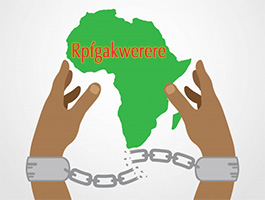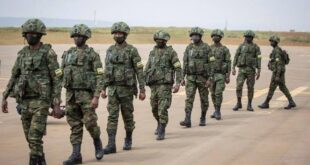By: Robert Patrick Fati Gakwerere
The Trump administration’s controversial “third country” deportation scheme has ignited a firestorm of criticism from African activists, human rights defenders, and political leaders. At the heart of the outrage is a growing belief that the United States is turning African nations into dumping grounds for dangerous foreign criminals it no longer wants on American soil.
On July 16, a U.S. government – chartered flight landed in the small southern African kingdom of Eswatini carrying five men – none of them Eswatini citizens, who had been convicted in the United States of serious violent crimes, including child rape, murder, armed robbery, gang-related violence, and homicide. The men, from Vietnam, Jamaica, Laos, Cuba, and Yemen, had served sentences of up to 25 years in American prisons.
Under the “third country” policy, individuals whose home countries refuse to accept their return can be deported to unrelated nations willing to take them. Eswatini, ruled by Africa’s last absolute monarch, was one such willing recipient.
Eswatini and South Sudan – The First Recipients
This was not the first time Africa has been used under the scheme. Earlier in July, Washington sent eight other convicted criminals to conflict-torn South Sudan, a country still struggling to emerge from years of civil war and instability.
The U.S. Supreme Court recently cleared the way for deportations to unrelated third countries, emboldening the Trump administration to negotiate more such deals. But rights groups say the policy tramples on human rights, undermines national sovereignty, and exports America’s public safety problems to vulnerable nations.
“The U.S. government sees us as a criminal dumpsite and disrespects the people of Eswatini,” said Wandile Dludlu, a leading pro-democracy activist and deputy president of the banned opposition party PUDEMO.
Washington’s Justification – and Africa’s Backlash
In a statement defending the move, Tricia McLaughlin, Assistant Secretary at the U.S. Department of Homeland Security, described the deportees as “depraved monsters” who were “so uniquely dangerous” that their home countries refused to take them back.
“These individuals have been terrorizing American communities,” she said, “but thanks to [Trump] they are off American soil.”
To many Africans, those words were an admission: the U.S. is offloading its most dangerous criminals onto countries with no connection to them, some of which are still grappling with poverty, fragile security, and post-conflict recovery.
The Bigger Plan: More African Countries in the Crosshairs
Eswatini and South Sudan are only the beginning. During a high-level summit at the White House earlier this month, Trump met with leaders from Liberia, Senegal, Guinea-Bissau, Mauritania, and Gabon to discuss similar deportation arrangements. The talks also touched on forcing countries to take back their nationals who have been denied the right to remain in the U.S.
Tom Homan, Trump’s former border enforcement chief, was blunt: “If there’s a public or national security threat, they’re not walking American streets. We’ll find a third safe nation to send them to, and we’re doing it.”
Rwanda has publicly confirmed negotiations for such a deal. Nigeria says it has refused.
A Dangerous Precedent
Critics warn that Trump’s deportation strategy sets a dangerous precedent: powerful nations dumping their unwanted criminals on smaller, less powerful states, regardless of whether those states have the capacity to manage the risks.
“It is neo-colonialism in its rawest form,” one African rights lawyer told this paper. “These are not relocation agreements. They are the outsourcing of America’s criminal justice burden to countries with fragile institutions. It is reckless and morally indefensible.”
As more African nations face pressure to sign onto the scheme, the debate intensifies: Will African governments stand up to Washington, or quietly agree to inherit its most dangerous convicts?
 Africa Just another WordPress site
Africa Just another WordPress site


